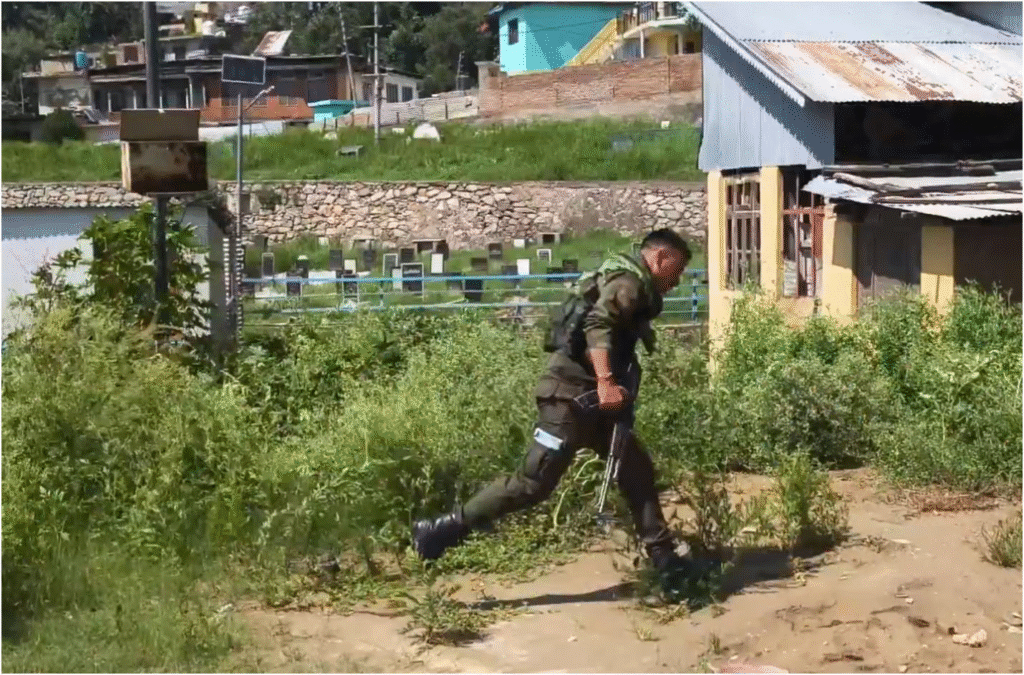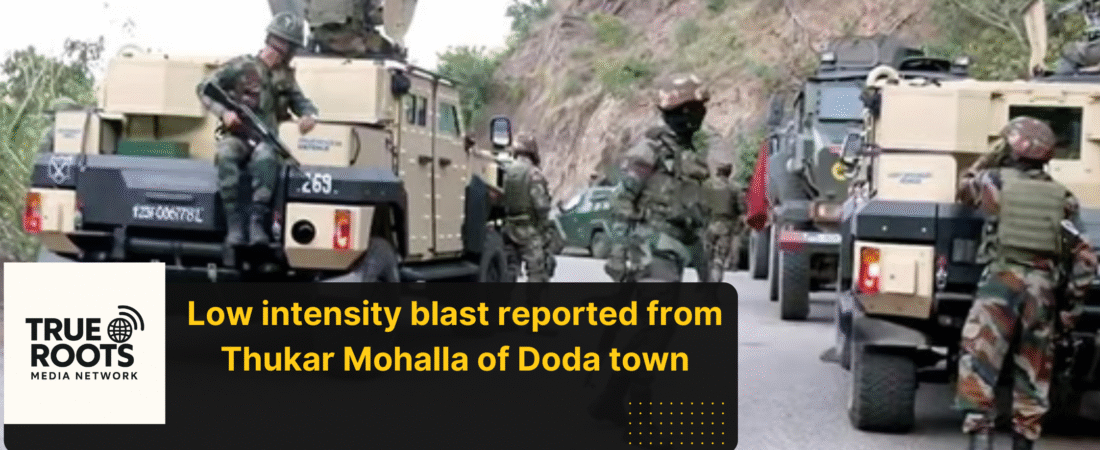DODA, September 11, 2025
A suspected blast in Jammu and Kashmir’s Doda district has sent shockwaves through the community, heightening an already volatile atmosphere fueled by the recent arrest of Aam Aadmi Party (AAP) MLA Mehraj Malik under the stringent Public Safety Act (PSA). The explosion, reported near Jamia Masjid in Dumri Mohalla, triggered widespread panic among residents, prompting a swift response from Jammu and Kashmir Police who have detained two individuals for questioning. As investigations unfold, the incident comes against the backdrop of escalating protests and administrative restrictions in the district, raising concerns over public order and potential links to the ongoing political unrest.

The blast occurred on Thursday morning in a densely populated area of Doda town, a key constituency in the Chenab Valley known for its sensitive demographic mix and history of social tensions. Eyewitnesses described hearing a loud explosion that shattered windows and caused minor structural damage to nearby buildings, including the mosque. No casualties have been reported so far, but the timing – just days after Malik’s detention – has amplified fears of orchestrated disruption. Police teams, including bomb disposal squads, cordoned off the site and initiated a thorough probe, examining the nature of the device and possible motives. “The investigation is underway, and we are leaving no stone unturned to ascertain the facts,” a senior police official stated, urging the public to remain calm and report any suspicious activity.

The Blast: Details and Immediate Aftermath
Sources confirmed the explosion took place in Dumri Mohalla, a residential neighborhood adjacent to Jamia Masjid, one of Doda’s prominent religious sites. Initial reports suggest it could be a low-intensity improvised explosive device (IED), though officials have not ruled out other possibilities like a gas cylinder mishap or accidental detonation. The Jammu and Kashmir Police arrived promptly, detaining two local persons believed to have been in the vicinity, for interrogation. Security has been beefed up across Doda, with additional checkpoints and patrols to prevent any escalation.
This incident marks a concerning development in a district already grappling with the fallout from recent natural disasters and political friction. Just weeks ago, Doda was ravaged by cloudbursts and flash floods that claimed lives and damaged infrastructure, straining local resources. The blast has compounded these challenges, disrupting daily life and commerce in an area where youth unemployment and economic hardships are rampant. Residents, many from marginalized communities, expressed anxiety over their safety, with one local shopkeeper noting, “We are still recovering from the floods, and now this – it’s like the ground is slipping from under our feet.”
Tensions Boiling Over: The Arrest of AAP MLA Mehraj Malik
The suspected blast unfolds amid heightened tensions following the arrest of Mehraj Malik, AAP’s lone MLA in the Jammu and Kashmir Assembly and the party’s J&K unit chief, on September 8. Malik, a 37-year-old firebrand leader from Doda, was detained under the PSA – a controversial law allowing preventive detention for up to two years without trial – on charges of disturbing public order. He is the first sitting legislator in J&K to face such action, sparking widespread condemnation and protests that have gripped the district.
Malik’s detention stems from an FIR registered against him for allegedly using abusive language against Doda Deputy Commissioner Harvinder Singh during a confrontation over relocating a health sub-center in Kencha village. The MLA accused the administration of ignoring his recommendations and misusing authority, while officials claimed he was attempting to favor a supporter by demanding rent payments for a structure on state land. Further, the PSA dossier, spanning over 250 pages, cites Malik’s “provocative speeches and Facebook Lives” as tools to spread misinformation and incite youth against the administration, potentially breaching public peace. Doda DC Harvinder Singh emphasized, “Every lawful action by the administration provides him an opportunity to spread lies and provoke the public, especially the youth, leading to large-scale breaches of peace.”
Since his arrest outside the Dak Bungalow in Doda while addressing the media, Malik has been shifted to Kathua jail. AAP supporters, viewing the move as politically motivated to silence dissent, have staged street protests, sit-ins, and marches in Doda town, Bhalessa (Malik’s hometown), and even Pulwama in the Kashmir Valley. On September 9 and 10, demonstrators raised slogans demanding his release and the revocation of PSA, leading to clashes with security forces who resorted to tear gas shells. Over 80 people have been detained in connection with the unrest, and authorities imposed prohibitory orders under Section 144, suspending mobile internet services and closing commercial establishments, including banks.
AAP leaders, including national MP Sanjay Singh and J&K in-charge Imran Hussain, were placed under house detention in Srinagar on September 11 to thwart a planned press conference and sit-in at Press Colony. Singh, who met Malik’s family, decried the arrest as “illegal and unconstitutional,” vowing to fight it on the streets, in Parliament, and potentially in the Supreme Court. “Demanding a hospital for his people is no crime; this is BJP’s way of crushing AAP’s growing influence,” he asserted. Arvind Kejriwal, AAP’s national convenor, echoed this, calling Malik “the lion of AAP” and stating that “jail and conspiracies won’t scare us.”
Political Backlash and Broader Implications
The developments have ignited a political firestorm across Jammu and Kashmir. Chief Minister Omar Abdullah strongly condemned the PSA invocation, labeling it a “discredited law” misused against an elected representative, eroding faith in democracy. “If the unelected government can target MLAs like this, how can people trust the system?” he questioned on social media. Congress MLA G.A. Mir called it “undemocratic,” while PDP’s Waheed Parra and Peoples Conference’s Sajad Lone denounced it as an assault on democratic institutions. Even the BJP, while welcoming action against Malik’s alleged abusive behavior, faces accusations of indirect involvement through the administration.
Malik’s political journey adds layers to the controversy. Elected in the 2024 Assembly polls by defeating BJP’s Gajay Singh Rana by 4,538 votes – AAP’s first win in J&K – he previously triumphed in the 2020 District Development Council elections from Kahara. Initially supporting the NC-Congress government, AAP withdrew in June 2025 to sit in opposition. Critics, including government employees who protested against him for targeting officials, portray Malik as a “habitual troublemaker,” but supporters see him as a voice for the underserved in flood-hit, infrastructure-poor Doda.
This episode highlights deeper issues in J&K’s fragile post-Article 370 landscape: the PSA’s history of targeting dissenters, from former CMs like Farooq and Omar Abdullah to activists; rising youth frustration amid economic woes; and the delicate balance of law enforcement in a region scarred by insurgency and recent terror incidents like the April 2025 Pahalgam attack that killed 26 tourists. With Doda’s per capita income below national averages and ongoing recovery from August’s cloudbursts that killed four and damaged over 10 houses, such events risk further alienating communities and stoking unrest.
As the blast investigation progresses, questions loom: Is it isolated, or linked to the political volatility? Security experts urge a multi-agency probe to rule out militant involvement, given Doda’s proximity to the Line of Control and past insurgent activities. The UT administration must navigate these tensions carefully to restore calm, perhaps through dialogue with opposition leaders, to prevent a spiral into broader instability.
Editorial Note: The suspected blast in Doda, coupled with Mehraj Malik’s PSA detention, underscores the urgent need for de-escalation and transparent governance in Jammu and Kashmir. While maintaining public order is paramount, invoking draconian laws against elected voices risks deepening divides and eroding democratic trust. True Roots Media calls for an impartial investigation into the blast and a review of PSA’s application, emphasizing dialogue over suppression to foster healing in a region still mending from floods and historical wounds. As tensions simmer, prioritizing community welfare over political vendettas could pave the way for true stability.
Know a Local Leader or Community Voice Standing for Peace in Doda? Have a story about someone in Jammu and Kashmir advocating for calm, justice, or recovery amid these challenges? Share their journey with us at info@truerootsmedia.com, and we’ll feature them in our upcoming stories to inspire unity and resilience.

